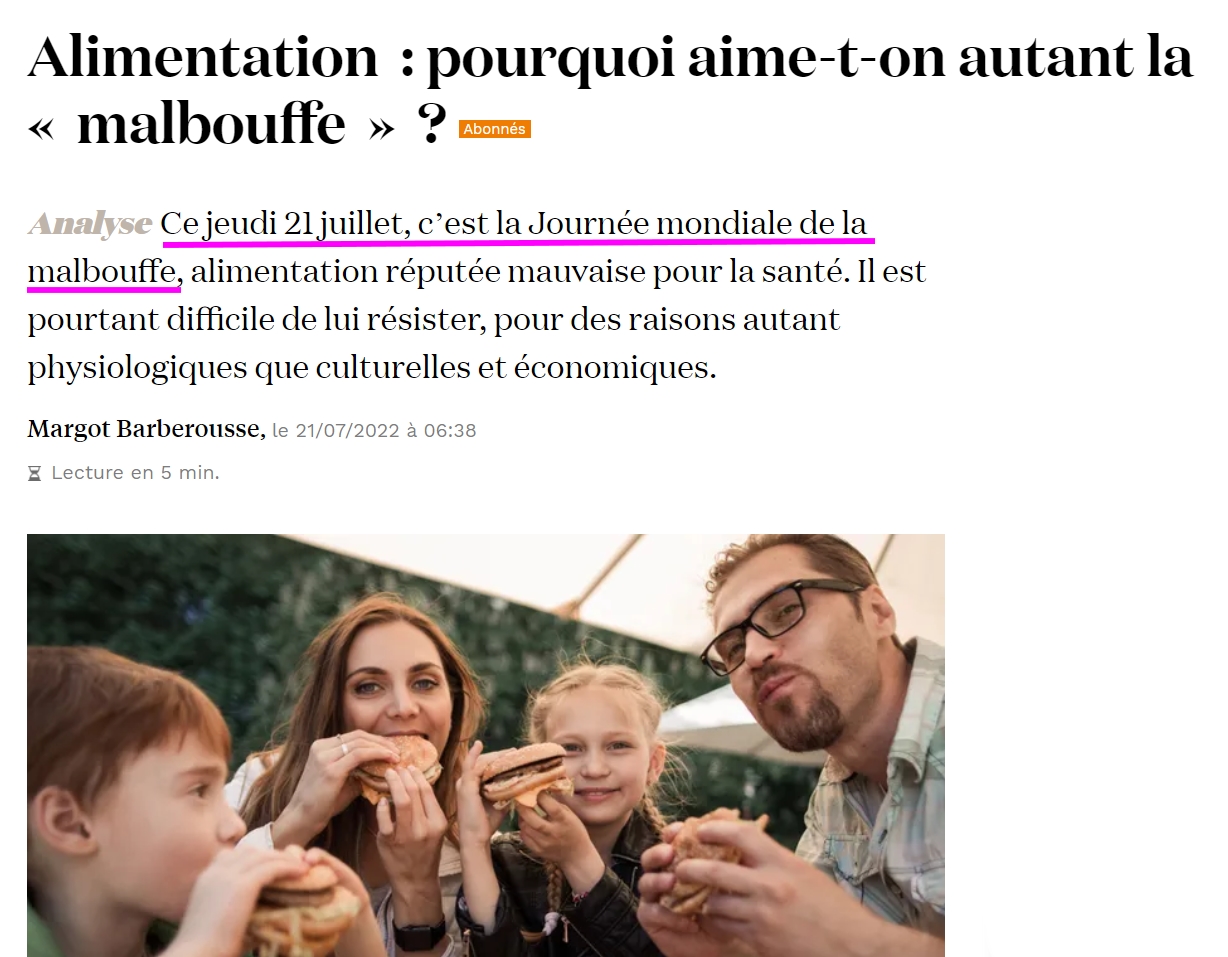 par Nutrimuscle-Conseils » 1 Sep 2022 18:59
par Nutrimuscle-Conseils » 1 Sep 2022 18:59
The trouble with ultra-processed foods
BMJ 2022; 378
The two papers linked to this editorial report associations between poor health outcomes and ultra-processed food and drinks.12 Both papers use the Nova food classification, which divides all foods into four groups according to the extent and purpose of their processing.3
Ultra-processed foods (Nova group 4) are industrial formulations made by deconstructing whole foods into chemical constituents, altering them and recombining them with additives into products that are alternatives to fresh and minimally processed foods and freshly prepared meals.4 Most ultra-processed foods are made, sold, and promoted by corporations, typically transnational, that formulate them to be convenient (ready to consume), affordable (low cost ingredients), and hyper-palatable, and thus liable to displace other foods and also to be over-consumed.5 This food group includes soft drinks; packaged snacks; commercial breads, cakes, and biscuits; confectionery; sweetened breakfast “cereals”; sugared milk based and “fruit” drinks; margarine; and pre-processed ready-to-eat or heat products such as burgers, pastas, and pizzas.
Systematic reviews and meta-analyses of large, well designed, long duration cohort studies carried out all over the world show that consumption of ultra-processed foods increases the risk of obesity, type 2 diabetes, hypertension, cardiovascular and cerebrovascular diseases, depression, and all cause mortality.6789 Other prospectively associated conditions include dyslipidaemias, hyperuricaemia, renal function decline, non-alcoholic liver disease, Crohn’s disease, and breast cancer.10
Most ultra-processed foods are energy dense products, high in fat, sugar, and salt and poor in fibre and micronutrients,4 and, as shown by a meta-analysis of national dietary surveys in 13 countries,11 a high intake of ultra-processed foods is associated with multiple nutrient imbalances. So the problem with ultra-processed products been suggested to be simply their poor nutrient profiles. However, a review of 37 cohort studies shows that the association between increased ultra-processed food consumption and various chronic disorders and diseases persists after control for dietary nutrient profiles.10 Furthermore, a randomised controlled trial has shown that diets based on ultra-processed foods, matched for macronutrients, sugar, sodium, and fibre with diets containing no ultra-processed foods, caused substantial increases in freely consumed daily calorie intake (almost 500 kcal (1 kcal=4.18 kJ)) and consequent body fat accumulation.12
These findings are in line with the important papers introduced here. One, reporting on a large prospective investigation in Italy (doi:10.1136/bmj-2022-070688), shows that increased ultra-processed food consumption is associated with higher cardiovascular and all cause mortality and states that: “Ultra-processed food intake . . . remained associated with mortality even after the poor nutritional quality of the diet was accounted for.”1 The other, reporting on a very large prospective investigation in the US (doi:10.1136/bmj-2021-068921), shows that increased ultra-processed food is associated with higher colorectal cancer deaths in men and states that: “These associations remained significant after further adjustment for body mass index or indicators of nutritional quality of the diet.”2
Furthermore, as stated by the authors of the Italian study, the ill effects of ultra-processed foods may be caused by “a variety of mechanisms triggered by non-nutritional components, such as cosmetic additives, food contact materials, neo-formed compounds, and degradation of the food matrix.” The US investigators state that: “Beyond poor nutrition profiles, ultra-processed foods commonly contain food additives such as dietary emulsifiers and artificial sweeteners, some types of which have been suggested to increase the pro-inflammatory potential of the gut microbiome, promoting colon carcinogenesis.”2 Ultra-processed foods have many other potentially pathogenic qualities. Examples are lack of protective phytochemicals found in whole plant foods and their often addictive potential.1314
Therefore, to reformulate ultra-processed foods by methods such as replacing sugar with artificial sweeteners or fat with modified starches, and adding extrinsic fibre, vitamins, and minerals, is not a solution. Reformulated ultra-processed foods would be especially troublesome if promoted as “premier” or “healthy” products. They would remain partly, mainly, or solely formulations of chemicals.15
What is to be done? Everybody needs food, but nobody needs ultra-processed foods (with the exception of infant formula, in the rare cases in which infants do not have access to breast milk). The analogy is tobacco. The rational solution is official public policies, including guidelines and publicity advising avoidance, and actions, including statutes, designed to reduce production and consumption of ultra-processed foods and to restrict or preferably prohibit their promotion.16
In the UK, a version of such policies commissioned by government has recently been rejected,1718 apparently on the grounds that populations need cheap foods, especially in hard times. But nobody sensible wants foods that cause illness. The overall positive solution includes making supplies of fresh and minimally processed foods (Nova group 1) available, attractive, and affordable. And sustaining national initiatives to promote and support freshly prepared meals made with fresh and minimally processed foods, using small amounts of processed culinary ingredients (group 2) and processed foods (group 3).519 Enacted, this will promote public health. It will also nourish families, society, economies, and the environment.19














